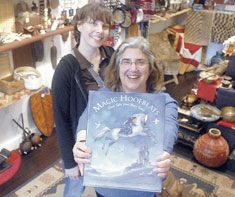| Author, illustrator plan meet and greet |
| Julia Cooper , Register Correspondent |

-MILFORD — Author Josepha Sherman and illustrator Linda Wingerter have seemingly been drawn together by coincidence.
Sherman, a recent transplant from Manhattan, created a multicultural collection of horse folktales titled "Magic Hoofbeats" in 2000. The book, published in 2004, came to life with illustrations by Wingerter, a West Haven resident and teacher of puppetry at Quinnipiac University.The two women, however, did not meet during the time they both spent working on the book. It took two more years for them to finally get to know each other through Artifax, a small shop in the downtown area offering art from around the world.
"I was exploring Artifax because it looked interesting," said Sherman, who was once an assistant curator at the Metropolitan Museum of Art. "I was wandering around and saw my book and said, ‘That’s me.’"
Sherman’s book grew out of her love for horses. She said her mother gave her a horse toy when she was three and "that was it." It was Sherman’s mother who also helped foster her writing.
"I’ve been writing since I can remember," said Sherman. "My mother was a screenwriter and short story writer. I was always encouraged to write."
Sherman chose folk tales because she said they are "a universal literature."
It was Wingerter’s own love of horses and past experiences that led her to illustrate Sherman’s book.
"The publisher told me that this was a book about horses," said Wingerter. "I grew up on a horse farm in Maine and Vermont. I love horses."
Wingerter also said that illustrating fairy tales and folklore is her "absolute favorite," and such work is hard to come by in the illustration field.
It was only after Sherman found her own book in Artifax that shop owner Ann Solomon decided the two women should get together and introduce their work to the community. In addition to a copy of "Magic Hoofbeats" on display at the store, Solomon also had additional illustrations by Wingerter, which often involve horses.
The store will hold a meet and greet with author and illustrator at 3 p.m. Nov. 25.
Solomon hopes members of the community will stop by to meet the women and have the opportunity to discuss what it means to be an author or an illustrator.
"Their work falls in line with what I try to do here in the shop, which is promote multiculturalism," Solomon said. "And I just couldn’t resist the synchronicity of the situation. It was just such a coincidence."
"At this event people are going to be allowed to ask questions," said Sherman. "We want that because all people are a closet writer or artist."
Wingerter said, "I’ll have my paintings and the book on display so I can show the process that goes on between the two."



